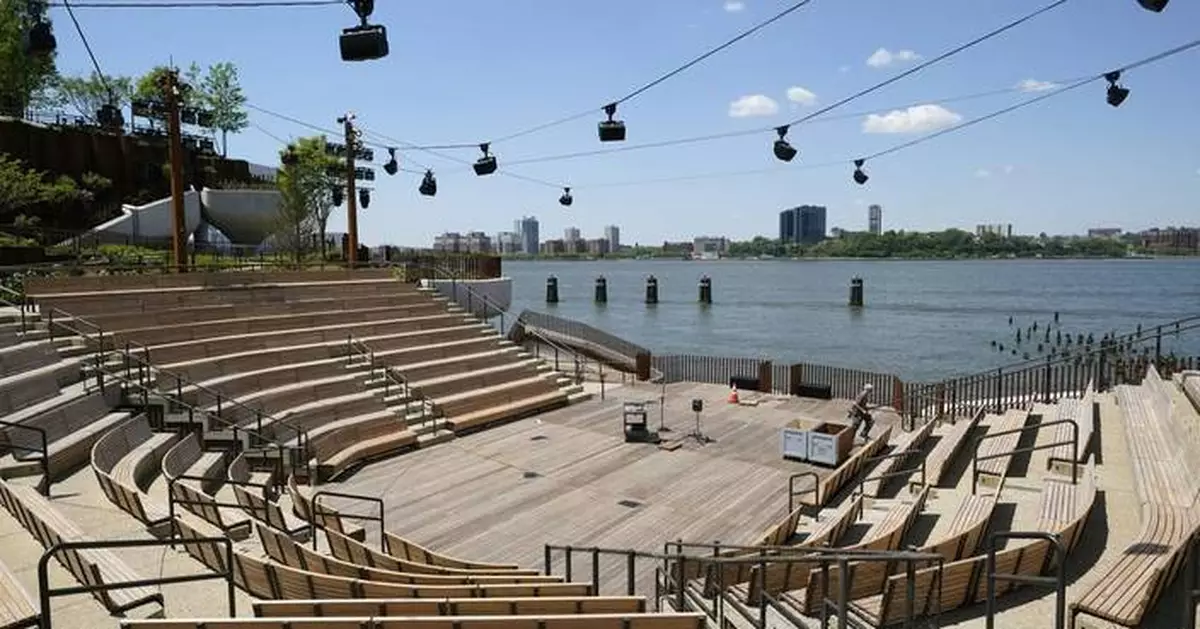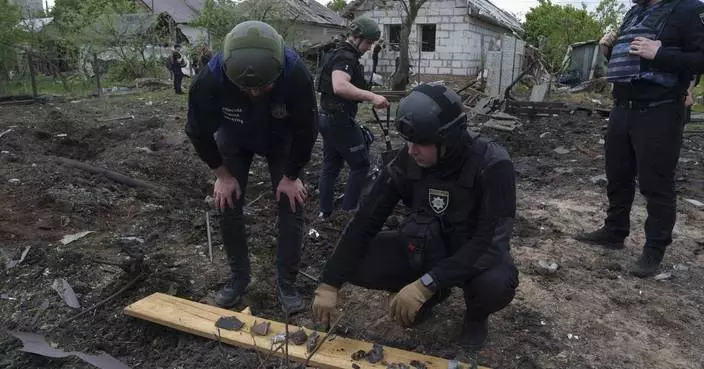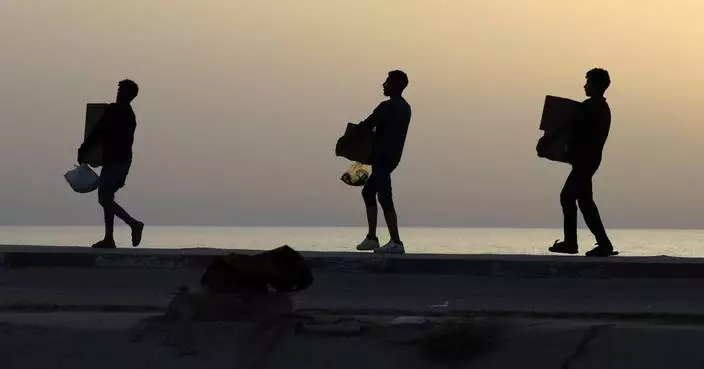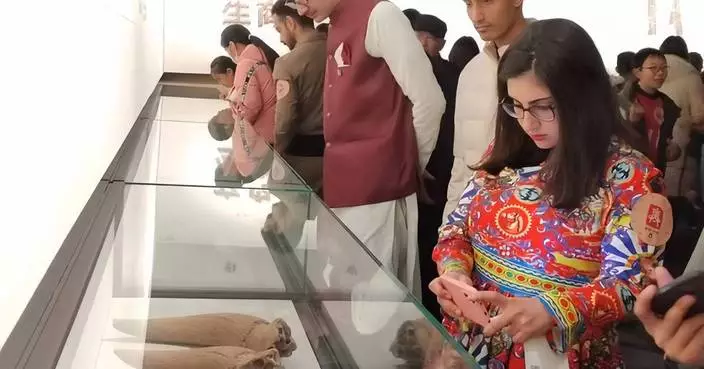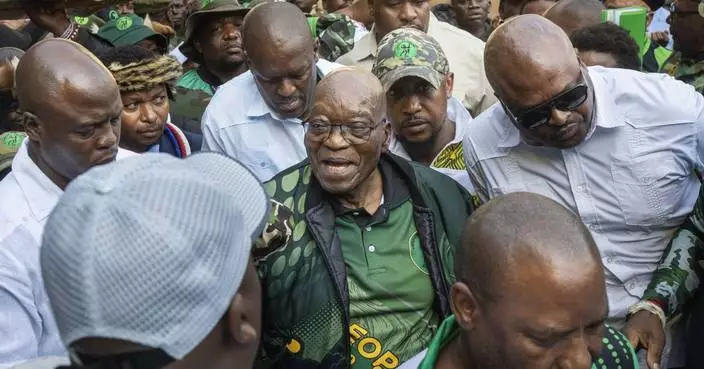NEW YORK (AP) — The 700-seat amphitheater at Little Island, a park in Manhattan built above the Hudson River on a series of tulip-shaped concrete columns, will open June 6 with Twyla Tharp’s “How Long Blues” in the choreographer’s first full-length work in a decade.
Countertenor Anthony Roth Costanzo will sing all the major roles in a 90-minute remix of Mozart’s “Le Nozze di Figaro (The Marriage of Figaro)” running from Aug. 30 to Sept. 22. The works are part of a summer schedule that includes nine world premieres.
Zack Winokur, a 35-year-old director, choreographer and dancer, was announced as producing artistic director on Monday. The announcement was made by media executive Barry Diller, who alongside designer Diane von Fürstenberg was the driving force behind the park and largely funded its construction.
The 2.4-acre (0.97-hectare) park opened in 2021 in west Chelsea, and the amphitheater will be the third new major performing space in Manhattan to launch in a five-year span. The Shed began in April 2019 at Hudson Yards on the far West Side and the Perelman Performing Arts Center started performances last September at the World Trade Center site downtown.
“We’re all going in happily different directions,” Winokur said, referring to the new venues. “It should not be doing what other people are doing.”
Ticket prices will be capped at $25. A second space, a 200-seat venue called The Glade, will include free programming from Wednesdays through Sundays in July and August and utilize different curators each week. Those include Suzan-Lori Parks, Cécile McLorin Salvant and Justin Vivian Bond.
“On any given night in July and August, you can stumble into this gorgeous park which is essentially like an iconic architectural swimming island with the botanical garden on it, with sublime sunsets where you can have a beer and some food and get a free show in The Glade,” Winokur said.
There will not be rain dates and it is not yet certain how long start times can be held for bad weather to clear.
“How Long Blues” will start previews June 1 in a collaboration among Tharp, T Bone Burnett and David Mansfield.
Costanzo, who last month was hired as CEO of Opera Philadelphia, will take on “Figaro” in a staging directed by Dustin Wills with new arrangements by Dan Schlosberg and costumes designed by Emily Bode.
Winokur will direct “Robeson,” with music by John Bitoy and Khari Lucas that stars bass-baritone Davóne Tines and rearranges music of Paul Robeson while telling his life story.
Henry Hoke’s “Open Throat” will be a mostly spoken work with shadow puppets based on the novella about a queer mountain lion living beneath the Hollywood sign.
“Mama” will be written and performed by Britton Smith, along with The Sting, his funk liberation band, and choreography by Ebony Williams.
“Day For Night,” a dance choreographed by Pam Tanowitz, will take place around sunset.
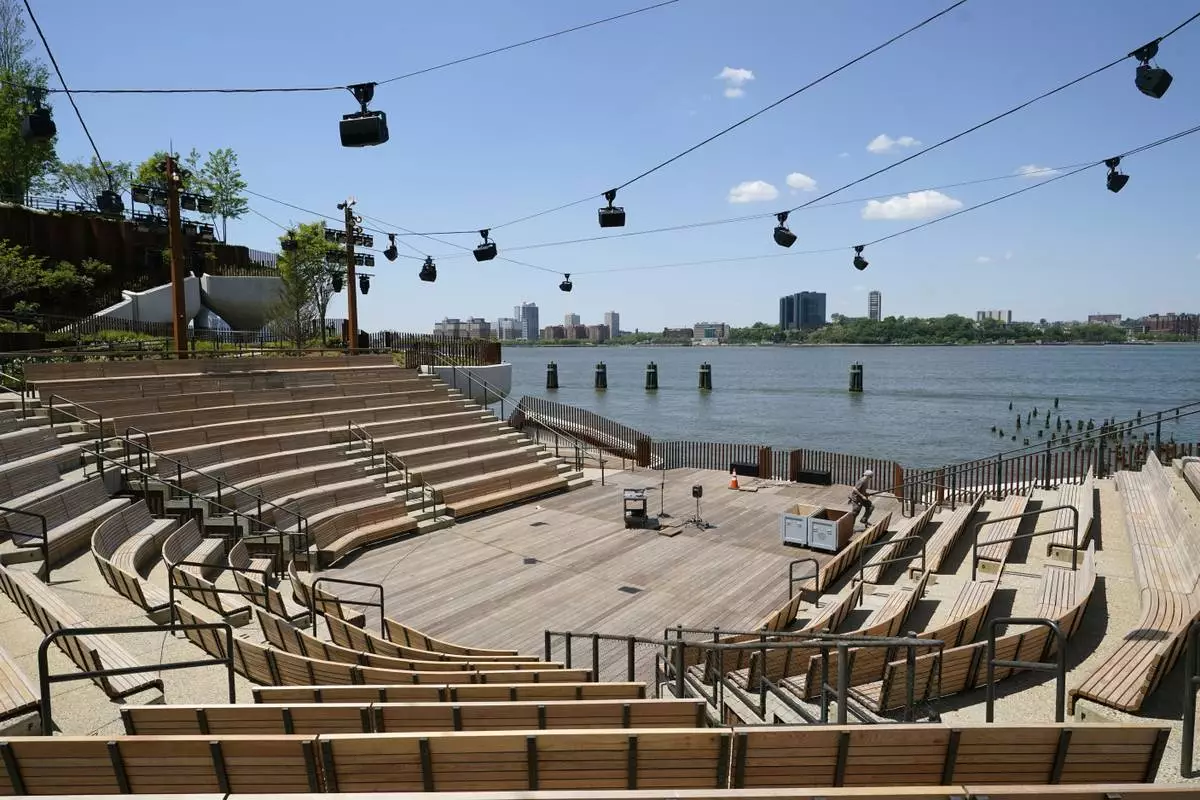
FILE - The amphitheater at Little Island appears in New York on May 18, 2021. The 700-seat amphitheater will open June 6 with Twyla Tharp’s “How Long Blues” in the choreographer’s first full-length work in a decade. (AP Photo/Kathy Willens, File)
TAIPEI, Taiwan (AP) — In a campaign ad for Taiwan’s President-elect Lai Ching-te, incumbent President Tsai Ing-wen was shown driving with Lai in the passenger seat, exchanging reflections on their years governing together. Tsai later turned over the driving to Lai, who was joined by running mate Bi-khim Hsiao.
The message was clear: Lai would steer the island in the direction set by Tsai, who after eight years in power was barred from running again.
Lai, 64, will take office Monday. Continuing Tsai’s legacy means aiming to strike a balance between cultivating Taiwan’s unofficial alliance with the United States and maintaining peace with China, which claims Taiwan as its own territory, to be retaken by force if necessary.
Lai is also expected to build on some of Tsai’s domestic reforms, despite political gridlock. Lai and Tsai’s Democratic Progressive Party has lost the majority in the legislature, making it hard for Lai to push through legislation, including the approval of crucial national defense budgets.
Tsai, 67, has been Taiwan’s first female president and one of Asia’s few female leaders who didn’t hail from a political dynasty. Her legacy will be tied to defending the island’s sovereignty from China while refashioning it as a credible partner for the U.S. and other democracies. She will also be remembered for overseeing the legalization of same sex-marriage, steering Taiwan through the COVID years and kickstarting the island’s military modernization.
She leaves office with high approval ratings. A recent poll by broadcaster TVBS showed 42% of respondents were satisfied with her eight-year performance. Her predecessor, Ma Ying-jeou, left office with approval ratings of around 23%.
Tsai’s popularity partly reflects a shift in Taiwan’s identity. A vast majority of residents now identify as Taiwanese as opposed to Chinese and want to be governed separately from Beijing. Taiwan and China have had different governments since a civil war in 1949 saw the Nationalists flee to the island while China’s Communist Party took control of the mainland.
Tsai veered from the more China-friendly policies of the previous ruling party, the Kuomintang. By the end of Ma’s tenure, the frequent exchanges with Beijing were making many Taiwanese nervous, said Shelley Rigger, a Taiwan expert at Davidson College.
Beijing called Tsai a separatist after she refused to acknowledge the 1992 Consensus, an agreement which says Taiwan is part of “One China.” While pulling away from Beijing, however, Tsai left a door open for communication.
“President Tsai has always said that Taiwan, under her leadership, is happy, willing and eager to have dialogue with Beijing, just not on terms unilaterally imposed by Beijing,” said Wen-Ti Sung, a fellow with Washington-based think tank Atlantic Council.
China has not only declined to speak to Tsai but also ramped up military and economic pressure on the island, sending warships and military jets near it daily.
Beijing prevents countries it has diplomatic relations with from having formal ties with Taipei. During Tsai’s tenure, it intensified a campaign to lure away the island’s few diplomatic partners. During Tsai’s years in office, China poached almost half of Taiwan’s diplomatic allies, bringing the remaining number to 12.
Tsai pushed back by diversifying trade relationships and increasing military spending including submarine development. She also elevated Taiwan’s standing on the international stage, said outgoing Foreign Minister Joseph Wu.
“Her leadership style is very moderate, but at the same time very firm in dealing with any kind of international pressure,” he said.
“She strengthened awareness of Taiwan around the world and its ties with the international community,” said Bonnie Glaser, the director of the Indo-Pacific program at the German Marshall Fund of the United States.
Lai, who served as vice president during Tsai's second term, came across as more of a firebrand earlier in his career. In 2017, he described himself as a “pragmatic worker for Taiwan’s independence,” drawing Beijing’s rebuke. He has since softened his stance and now supports maintaining the status quo across the Taiwan Strait and the possibility of talks with Beijing.
“Lai has spent the last two-plus years trying to convince the world that he is Tsai Ing-wen 2.0,” said Lev Nachman, an assistant professor at National Chengchi University.
Lai will build on Tsai’s efforts to strengthen ties with the U.S., which doesn’t formally recognize Taiwan as a country but is bound by its own laws to provide the island with the means to defend itself.
By some measures, Lai’s greatest uncertainty on the foreign policy front might come from Washington. A new Donald Trump administration could throw off whatever balance Tsai has achieved in Taipei’s relations with Washington and Beijing, Nachman said.
During Tsai's tenure, Taiwan became the first society in Asia to legalize same-sex marriage, though critics say she skirted political responsibility by leaving the decision up to the Supreme Court and a series of referendums.
She oversaw a controversial pension and labor reform and extended the military conscription length to one year. She also kickstarted a military modernization drive, including a program for building indigenous submarines at more than $16 billion each.
Tsai’s leadership during the COVID pandemic split public opinion, with most admiring Taiwan’s initial ability to keep the virus largely outside its borders but criticizing the lack of investment in rapid testing as the pandemic progressed.
Tsai’s mixed success on the domestic policy front contributed to historically poor results for the DPP in local elections, said Sung with the Atlantic Council. The party’s poor performance in the 2022 elections led to Tsai resigning as party chairwoman. And while Lai won the presidential election, DPP lost its majority in the legislature.
“Much of President Tsai’s government’s success comes from the foreign policy and related international outreach fronts, and in terms of making inroads on the much more grassroots party machinery level, for example, those still have room for improvement,” Sung said.

A supporter of opposition Taiwan People's Party (TPP) holds a guava, symbolizing dishonored ballot during a march to protest against Lai Ching-te's ruling Democratic Progressive party a day before his presidential inauguration in Taipei, Taiwan, Sunday, May 19, 2024. TPP demands that Lai''s government must implement parliamentary, judicial and constitutional reforms. (AP Photo/Chiang Ying-ying)

Supporters of opposition Taiwan People's Party (TPP) stage a rally to protest against Lai Ching-te’s ruling Democratic Progressive party, a day before his presidential inauguration in Taipei, Taiwan, Sunday, May 19, 2024. TPP demands that Lai's government must implement parliamentary, judicial and constitutional reforms. (AP Photo/Chiang Ying-ying)

Supporters of opposition Taiwan People's Party (TPP) gather to protest against Lai Ching-te’s ruling Democratic Progressive party, a day before his presidential inauguration in Taipei, Taiwan, Sunday, May 19, 2024. TPP demands that Lai's government must implement parliamentary, judicial and constitutional reforms. (AP Photo/Chiang Ying-ying)

Supporters of opposition Taiwan People's Party (TPP) march to protest against Lai Ching-te’s ruling Democratic Progressive party, a day before his presidential inauguration in Taipei, Taiwan, Sunday, May 19, 2024. TPP demands that Lai's government must implement parliamentary, judicial and constitutional reforms. (AP Photo/Chiang Ying-ying)

FILE - Taiwan's President Tsai Ing-wen delivers a speech during the naming and launching ceremony of domestically-made submarines at CSBC Corp's shipyards in Kaohsiung, southern Taiwan, Sept. 28, 2023. Taiwan's president-elect Lai Ching-te is set to take office on May 20. Building on the legacy of incumbent president Tsai, Ing-wen means aiming to strike a balance between cultivating Taiwan's unofficial alliance with the United States, and maintaining peace with China, which claims Taiwan as its own territory, to be retaken by force if necessary. (AP Photo/Chiang Ying-ying, File)

FILE - In this photo released by the Taiwan Presidential Office, Taiwan's President Tsai Ing-wen, speaks at a luncheon during a visit by a Congressional delegation to Taiwan in Taipei, Taiwan, April 8, 2023. Taiwan's president-elect Lai Ching-te is set to take office on May 20. Building on the legacy of incumbent president Tsai, Ing-wen means aiming to strike a balance between cultivating Taiwan's unofficial alliance with the United States, and maintaining peace with China, which claims Taiwan as its own territory, to be retaken by force if necessary. (Taiwan Presidential Office via AP, File)

Supporters watch an ad showing then Taiwan Democratic Progressive Party (DPP) presidential candidate Lai Ching-te in a car driven by incumbent president Tsai Ing-wen during a rally held in New Taipei, Taiwan, on Saturday, Jan. 6, 2024. In the campaign ad, Taiwan's president-elect Lai Ching-te and incumbent president Tsai Ing-wen was shown driving steadily on the island's roads with Lai in the passenger seat, exchanging barbs and reflections on their years governing together. (AP Photo/Ng Han Guan)

FILE - Taiwan Democratic Progressive Party (DPP) presidential candidate Lai Ching-te, who also goes by William, is greeted by supporters during an election canvass of a neighborhood in Taoyuan, Taiwan, Jan. 11, 2024, ahead of the presidential election. Lai Ching-te is set to take office as Taiwan's new president on May 20. Building on the legacy of incumbent president Tsai, Ing-wen means aiming to strike a balance between cultivating Taiwan's unofficial alliance with the United States, and maintaining peace with China, which claims Taiwan as its own territory, to be retaken by force if necessary. (AP Photo/Louise Delmotte, File)

FILE - Taiwanese Vice President Lai Ching-te, also known as William Lai celebrates his victory after Taiwan's presidential election, in Taipei, Taiwan, Saturday, Jan. 13, 2024. Lai Ching-te is set to take office as Taiwan's new president on May 20. Building on the legacy of incumbent president Tsai, Ing-wen means aiming to strike a balance between cultivating Taiwan's unofficial alliance with the United States, and maintaining peace with China, which claims Taiwan as its own territory, to be retaken by force if necessary. (AP Photo/Chiang Ying-ying, File)



